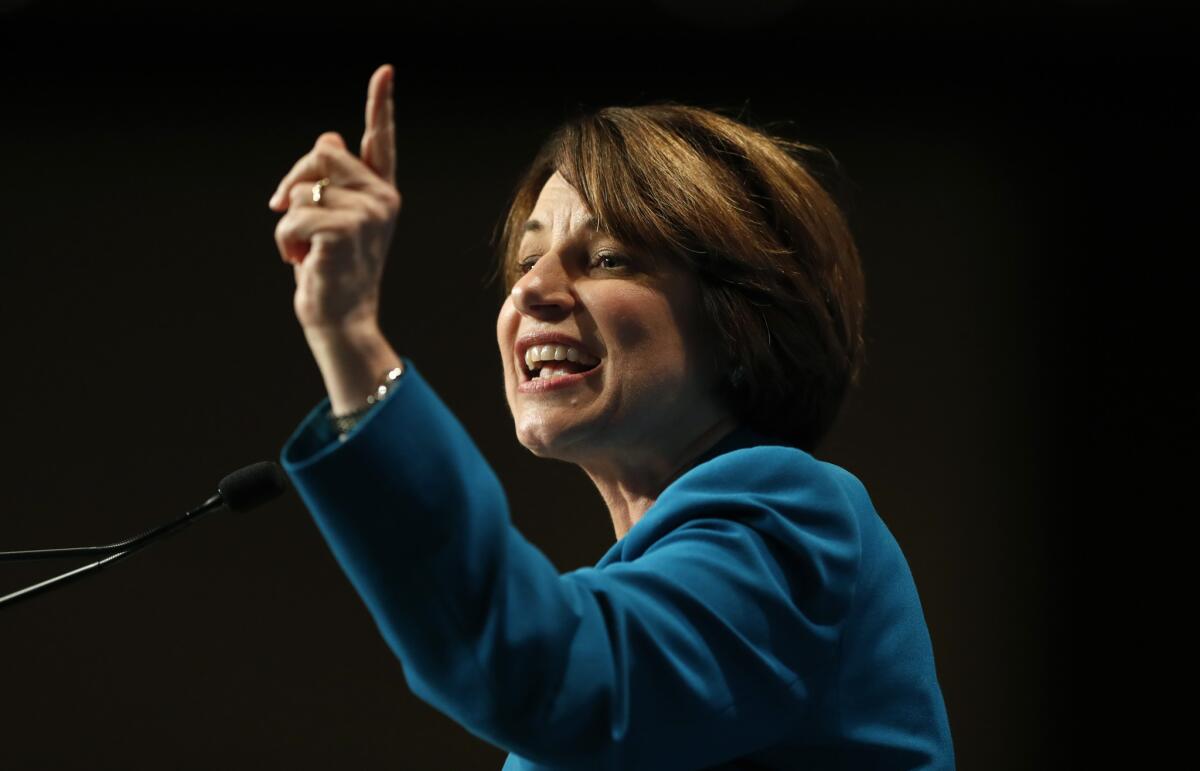Editorial: Congress must act now to ensure a safe presidential election

- Share via
Even as some states and localities are “reopening” businesses and public spaces, it is likely that the COVID-19 pandemic will still be with us in November when Americans will elect a president, the entire membership of the U.S. House and more than a third of the U.S. Senate.
It is past time for Congress to require states to expand opportunities for voting by mail and early voting — and to help pay for those changes — so that Americans on Nov. 3 aren’t faced with a choice between protecting their health and exercising the most important right of citizens in a democracy.
That was the grim dilemma encountered by voters in Wisconsin’s April 7 election, when — despite social distancing and other precautions — dozens of voters and poll workers may have been infected at polling places. It’s vital that Congress act now to prevent voters across the country from encountering a similar situation in November, which could lower turnout as well as spread disease.
Congress included $400 million for state election systems in a coronavirus stimulus package approved in March. But that sum falls far short of what is required to make it possible for states — especially those that lack experience with extensive voting by mail — to prepare for an election in which most votes might have to be cast by that method.
The House passed a new coronavirus relief bill Friday that would give state election systems $3.6 billion to respond to the pandemic — a sum much closer to estimates by outside election experts of what will be required to conduct elections during this crisis. But Congress must act quickly; according to an analysis by the Brennan Center for Justice, states will have to start preparing this month if they’re going to be ready for voting by mail in the fall.
It’s also important that states take precautions to protect the health of voters who will cast their ballots in person, an option that must remain for disabled voters and those with unreliable mail delivery. Generous arrangements for early voting will reduce congestion at polling places, and election officials also must be prepared to sanitize those locations to protect the health of voters and poll workers.
Shoring up election systems to respond to the pandemic should be a bipartisan cause. But while some Republican governors recognize the importance of expanding voting by mail, Republicans in Washington haven’t risen to the occasion. Some GOP senators have expressed concern about a “federal takeover of the election process.” President Trump has called voting by mail a “terrible thing,” complained that it hurts Republicans, and suggested without offering proof that expanding the practice could lead to massive fraud. (Never mind that Trump voted by absentee ballot in Florida’s primary.)
Alarmism about a “federal takeover” of elections ignores the Constitution‘s instruction that, while states are responsible for the “time, places and manner” of congressional elections, Congress may “at any time make or alter such regulations.” Congress also has legislated regulations for presidential elections. It would be shameful if Republicans refused to exercise that authority to make it easier for Americans to vote during a public-health crisis. But then, the GOP in recent years has been the party trying to make it harder to cast a ballot.
Sen. Amy Klobuchar (D-Minn.), who along with Sen. Ron Wyden (D-Ore.) introduced a separate bill to help states expand voting by mail, suggested that there could be negotiations with Republicans if they showed interest, though she said she would oppose any provisions that would suppress the right to vote.
Some compromises might be acceptable. While the problem of fraud in absentee voting is vastly exaggerated, occasional abuses have occurred. Some Republicans might be willing to support expanded voting by mail in exchange for a requirement that states minimize the possibility of fraud and error, including by placing limits on so-called “ballot harvesting,” the collection and delivery of multiple ballots by activists or party members. That’s a reasonable compromise.
But if Republicans in the Senate erect too many obstacles to an expansion of voting by mail and other measures to safeguard voting in this extraordinarily emergency, they will face the judgment of history — and of the voters they disenfranchised or endangered. They will play politics with this issue at their peril.
Members of Congress of both parties have recognized that the COVID-19 contagion requires new thinking. If the damage inflicted on the economy by the virus justified a massive federal response, so does the threat the pandemic poses to democracy. Time is running out.
A cure for the common opinion
Get thought-provoking perspectives with our weekly newsletter.
You may occasionally receive promotional content from the Los Angeles Times.







